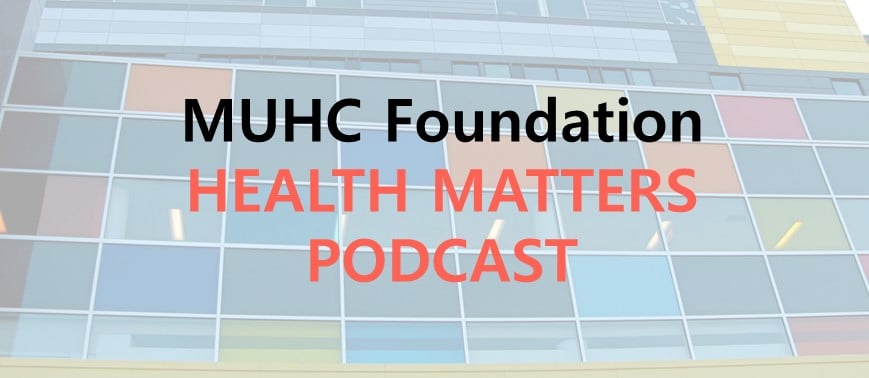This week on Health Matters, Tarah Schwartz revisits conversations with the doctors, clinician-scientists and researchers from the MUHC who are on the front lines of advancing research and leading the path for innovation. Dr. Irah King discusses what we can learn from the microbiome. Dr. Ben Smith from the Montreal Chest Institute shares why some people have resilient lungs and others don’t.
Our microbiomes and intestinal health
(Time on podcast: 0:28). Irah King is an intestinal immunologist who studies how our immune system (white blood cells) in our intestine actually contribute to our health or in some cases exacerbate disease. Our intestine is an incredible organ because it not only absorbs nutrients from our diets, but it also sets the “inflammatory tone” of our bodies. The intestine can detect and interpret all the lifestyle choices we make (our diet, medications, our environment). Our immune system can be shaped by these interactions. In our intestine, we have the microbiome, trillions of microbes, viruses, and bacteria that shape how we absorb food and how our immune system actually responds. A number of exciting research projects are actually going on at the RI-MUHC. One study is looking at the relationship between viruses and bacteria in inflammatory bowel diseases. Even though we have the general idea of the bacteria that may be causing some of these intestinal problems, we now know that there are some viruses that actually infect these bacteria and kill bad bacteria to protect us from disease. Imagine if we can isolate these viruses and use them in vulnerable people to actually decrease the inflammation in the intestine and help cure or improve their diseases. Our microbiomes are highly personalized, but there is hope that we can influence these microbiomes to promote healthy intestines and health benefits. In the laboratory, we can actually breed germ-free mice and use them as a powerful research tools to study diseases to see what happens when we introduce or modify microbiomes. For example. if a germ-free mouse is introduced to the microbiome from a thin individual, the mouse remains thin. In contrast, if a germ-free mouse is introduced to the microbiome from an obese individual, the mouse becomes obese. This tells us that our microbiomes are a key determinant in whether we develop a disease or not.
Resilient lungs
(Time on podcast: 11:45). Lung diseases are a big problem in the world. Ben Smith’s research is focused on “resilient lungs”. When we think of studying diseases, we are often focused only on those that are suffering from the disease. Ben Smith is looking at the opposite – people that don’t develop lung diseases. Using state of the art imaging technologies, his team looked at people with health or resilient lungs, and they found that there is a lot of variability in people’s lungs. They found that certain types of lungs were resistant to diseases, while other types of lungs were actually susceptible to disease. So, we are left with the question, how can we promote “resilient lungs”? One strong signal that this research is showing is the shape and size of the airway tree is very important. There is a great amount of variation in the shape of this tree – from thin to large. People who are on the narrow end are at high risk of developing lung diseases. At the other end of the spectrum, those with the larger airways had less risk of developing disease, even if they were heavy smokers. Therefore, this variation in airway tree structure seems to be very important. One can also imagine that this variation of the airway tree can have an impact on medication delivery. The shape of the lung may even impact how well an inhaled medication is delivered to the lungs. Imaging of the lungs is currently done using CT scans. Ben Smith and his team are working to improve imaging technologies to study our lungs and airway trees.
Listen to the podcast
Best of Health Matters: Excellence in research and innovation. The MUHC Foundation’s Health Matters. January 2, 2022
Where to listen:
Web: http://bit.ly/3aQfvVQ
Spotify: https://spoti.fi/32HFxrc
Apple: https://apple.co/35NvItS
